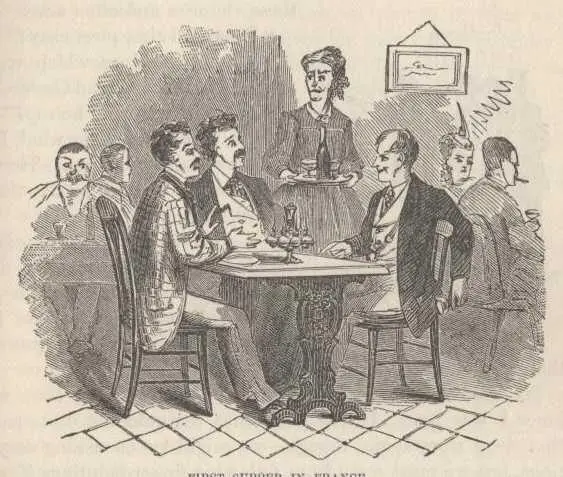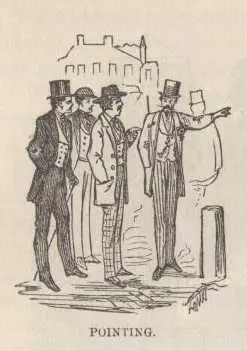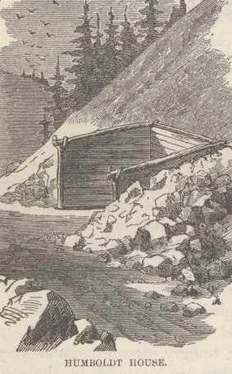Mark Twain - The Innocents Abroad
Здесь есть возможность читать онлайн «Mark Twain - The Innocents Abroad» весь текст электронной книги совершенно бесплатно (целиком полную версию без сокращений). В некоторых случаях можно слушать аудио, скачать через торрент в формате fb2 и присутствует краткое содержание. Год выпуска: 2004, Жанр: Классическая проза, Юмористическая проза, на английском языке. Описание произведения, (предисловие) а так же отзывы посетителей доступны на портале библиотеки ЛибКат.
- Название:The Innocents Abroad
- Автор:
- Жанр:
- Год:2004
- ISBN:нет данных
- Рейтинг книги:5 / 5. Голосов: 1
-
Избранное:Добавить в избранное
- Отзывы:
-
Ваша оценка:
- 100
- 1
- 2
- 3
- 4
- 5
The Innocents Abroad: краткое содержание, описание и аннотация
Предлагаем к чтению аннотацию, описание, краткое содержание или предисловие (зависит от того, что написал сам автор книги «The Innocents Abroad»). Если вы не нашли необходимую информацию о книге — напишите в комментариях, мы постараемся отыскать её.
The Innocents Abroad — читать онлайн бесплатно полную книгу (весь текст) целиком
Ниже представлен текст книги, разбитый по страницам. Система сохранения места последней прочитанной страницы, позволяет с удобством читать онлайн бесплатно книгу «The Innocents Abroad», без необходимости каждый раз заново искать на чём Вы остановились. Поставьте закладку, и сможете в любой момент перейти на страницу, на которой закончили чтение.
Интервал:
Закладка:
"Oh, go to the pier, you old fool—that's where we want to go!"
We reasoned calmly with Dan that it was useless to speak to this foreigner in English—that he had better let us conduct this business in the French language and not let the stranger see how uncultivated he was.
"Well, go on, go on," he said, "don't mind me. I don't wish to interfere. Only, if you go on telling him in your kind of French, he never will find out where we want to go to. That is what I think about it."
We rebuked him severely for this remark and said we never knew an ignorant person yet but was prejudiced. The Frenchman spoke again, and the doctor said:
"There now, Dan, he says he is going to allez to the douain. Means he is going to the hotel. Oh, certainly—we don't know the French language."
This was a crusher, as Jack would say. It silenced further criticism from the disaffected member. We coasted past the sharp bows of a navy of great steamships and stopped at last at a government building on a stone pier. It was easy to remember then that the douain was the customhouse and not the hotel. We did not mention it, however. With winning French politeness the officers merely opened and closed our satchels, declined to examine our passports, and sent us on our way. We stopped at the first cafe we came to and entered. An old woman seated us at a table and waited for orders.

The doctor said: "Avez-vous du vin?"
The dame looked perplexed. The doctor said again, with elaborate distinctness of articulation:
"Avez-vous du—vin!"
The dame looked more perplexed than before. I said:
"Doctor, there is a flaw in your pronunciation somewhere. Let me try her. Madame, avez-vous du vin?—It isn't any use, Doctor—take the witness."
"Madame, avez-vous du vin—du fromage—pain—pickled pigs' feet—beurre—des oeufs—du boeuf—horseradish, sauerkraut, hog and hominy—anything, anything in the world that can stay a Christian stomach!"
She said:
"Bless you, why didn't you speak English before? I don't know anything about your plagued French!"
The humiliating taunts of the disaffected member spoiled the supper, and we dispatched it in angry silence and got away as soon as we could. Here we were in beautiful France—in a vast stone house of quaint architecture—surrounded by all manner of curiously worded French signs—stared at by strangely habited, bearded French people—everything gradually and surely forcing upon us the coveted consciousness that at last, and beyond all question, we were in beautiful France and absorbing its nature to the forgetfulness of everything else, and coming to feel the happy romance of the thing in all its enchanting delightfulness—and to think of this skinny veteran intruding with her vile English, at such a moment, to blow the fair vision to the winds! It was exasperating.
We set out to find the centre of the city, inquiring the direction every now and then. We never did succeed in making anybody understand just exactly what we wanted, and neither did we ever succeed in comprehending just exactly what they said in reply, but then they always pointed—they always did that—and we bowed politely and said, "Merci, monsieur," and so it was a blighting triumph over the disaffected member anyway. He was restive under these victories and often asked:
"What did that pirate say?"
"Why, he told us which way to go to find the Grand Casino."
"Yes, but what did he say?"
"Oh, it don't matter what he said—we understood him. These are educated people—not like that absurd boatman."

"Well, I wish they were educated enough to tell a man a direction that goes some where—for we've been going around in a circle for an hour. I've passed this same old drugstore seven times."
We said it was a low, disreputable falsehood (but we knew it was not). It was plain that it would not do to pass that drugstore again, though—we might go on asking directions, but we must cease from following finger-pointings if we hoped to check the suspicions of the disaffected member.
A long walk through smooth, asphaltum-paved streets bordered by blocks of vast new mercantile houses of cream-colored stone every house and every block precisely like all the other houses and all the other blocks for a mile, and all brilliantly lighted—brought us at last to the principal thoroughfare. On every hand were bright colors, flashing constellations of gas burners, gaily dressed men and women thronging the sidewalks—hurry, life, activity, cheerfulness, conversation, and laughter everywhere! We found the Grand Hotel du Louvre et de la Paix, and wrote down who we were, where we were born, what our occupations were, the place we came from last, whether we were married or single, how we liked it, how old we were, where we were bound for and when we expected to get there, and a great deal of information of similar importance—all for the benefit of the landlord and the secret police. We hired a guide and began the business of sightseeing immediately. That first night on French soil was a stirring one. I cannot think of half the places we went to or what we particularly saw; we had no disposition to examine carefully into anything at all—we only wanted to glance and go—to move, keep moving! The spirit of the country was upon us. We sat down, finally, at a late hour, in the great Casino, and called for unstinted champagne. It is so easy to be bloated aristocrats where it costs nothing of consequence! There were about five hundred people in that dazzling place, I suppose, though the walls being papered entirely with mirrors, so to speak, one could not really tell but that there were a hundred thousand. Young, daintily dressed exquisites and young, stylishly dressed women, and also old gentlemen and old ladies, sat in couples and groups about innumerable marble-topped tables and ate fancy suppers, drank wine, and kept up a chattering din of conversation that was dazing to the senses. There was a stage at the far end and a large orchestra; and every now and then actors and actresses in preposterous comic dresses came out and sang the most extravagantly funny songs, to judge by their absurd actions; but that audience merely suspended its chatter, stared cynically, and never once smiled, never once applauded! I had always thought that Frenchmen were ready to laugh at any thing.
Part 2
CHAPTER XI.
Getting used to it—No Soap—Bill of Fare, Table d'hote—"An American Sir"—A Curious Discovery—The "Pilgrim" Bird—Strange Companionship—A Grave of the Living—A Long Captivity—Some of Dumas' Heroes—Dungeon of the Famous "Iron Mask."
We are getting foreignized rapidly and with facility. We are getting reconciled to halls and bedchambers with unhomelike stone floors and no carpets—floors that ring to the tread of one's heels with a sharpness that is death to sentimental musing. We are getting used to tidy, noiseless waiters, who glide hither and thither, and hover about your back and your elbows like butterflies, quick to comprehend orders, quick to fill them; thankful for a gratuity without regard to the amount; and always polite—never otherwise than polite. That is the strangest curiosity yet—a really polite hotel waiter who isn't an idiot. We are getting used to driving right into the central court of the hotel, in the midst of a fragrant circle of vines and flowers, and in the midst also of parties of gentlemen sitting quietly reading the paper and smoking. We are getting used to ice frozen by artificial process in ordinary bottles—the only kind of ice they have here. We are getting used to all these things, but we are not getting used to carrying our own soap. We are sufficiently civilized to carry our own combs and toothbrushes, but this thing of having to ring for soap every time we wash is new to us and not pleasant at all. We think of it just after we get our heads and faces thoroughly wet or just when we think we have been in the bathtub long enough, and then, of course, an annoying delay follows. These Marseillaises make Marseillaise hymns and Marseilles vests and Marseilles soap for all the world, but they never sing their hymns or wear their vests or wash with their soap themselves.
Читать дальшеИнтервал:
Закладка:
Похожие книги на «The Innocents Abroad»
Представляем Вашему вниманию похожие книги на «The Innocents Abroad» списком для выбора. Мы отобрали схожую по названию и смыслу литературу в надежде предоставить читателям больше вариантов отыскать новые, интересные, ещё непрочитанные произведения.
Обсуждение, отзывы о книге «The Innocents Abroad» и просто собственные мнения читателей. Оставьте ваши комментарии, напишите, что Вы думаете о произведении, его смысле или главных героях. Укажите что конкретно понравилось, а что нет, и почему Вы так считаете.












